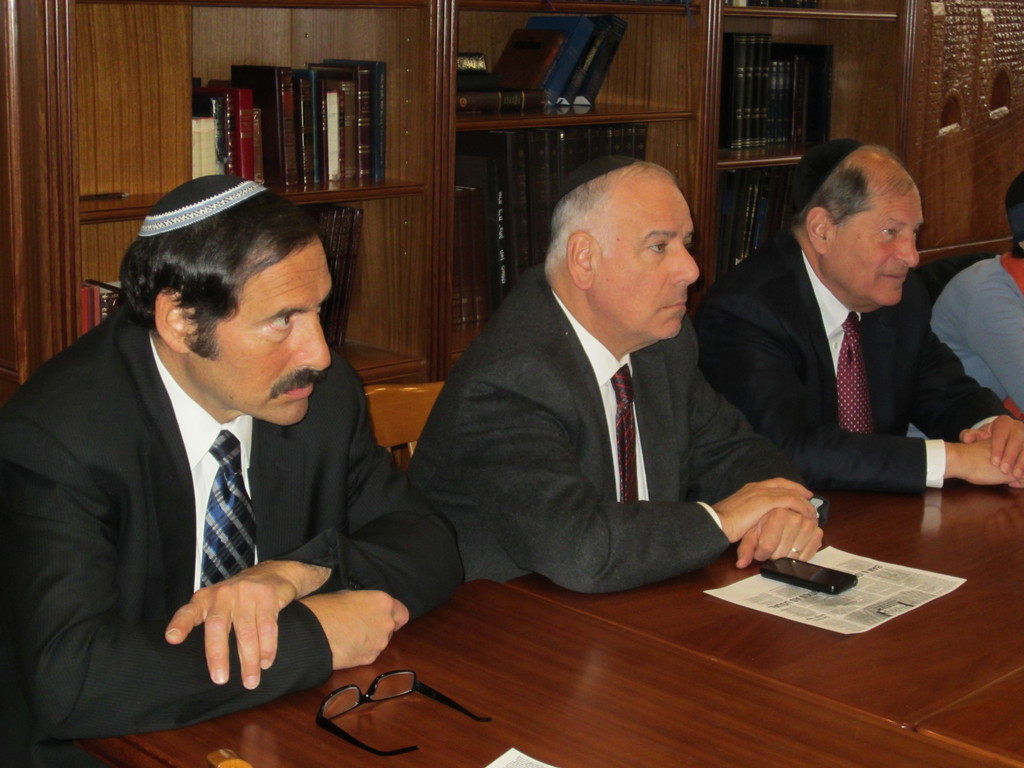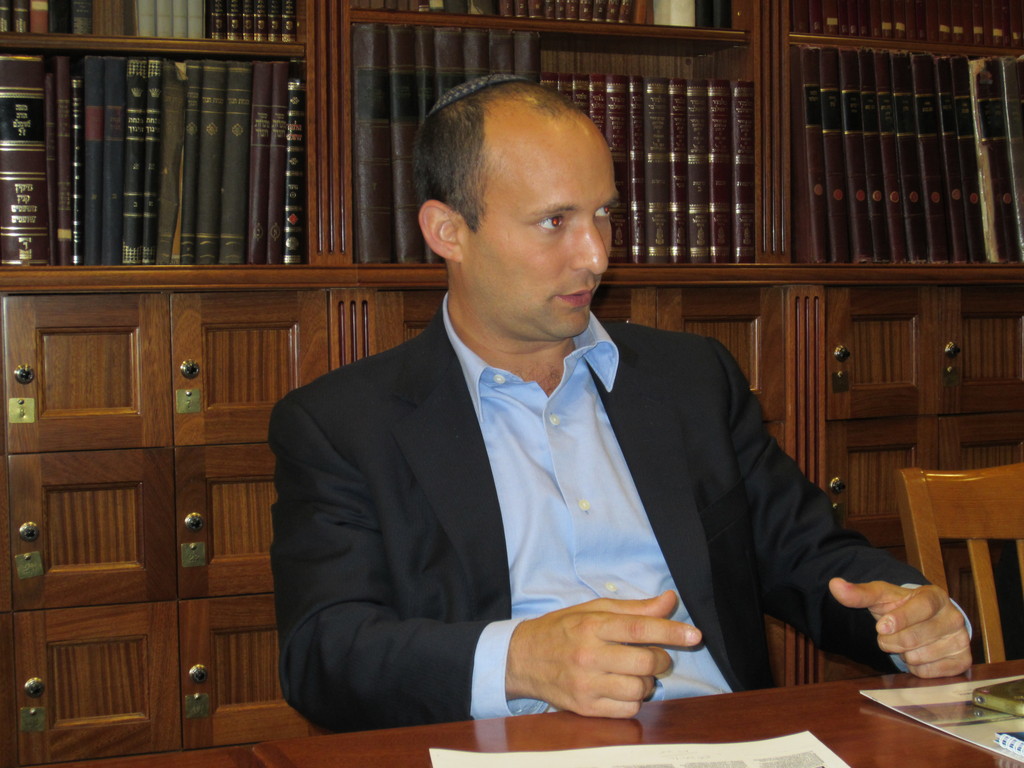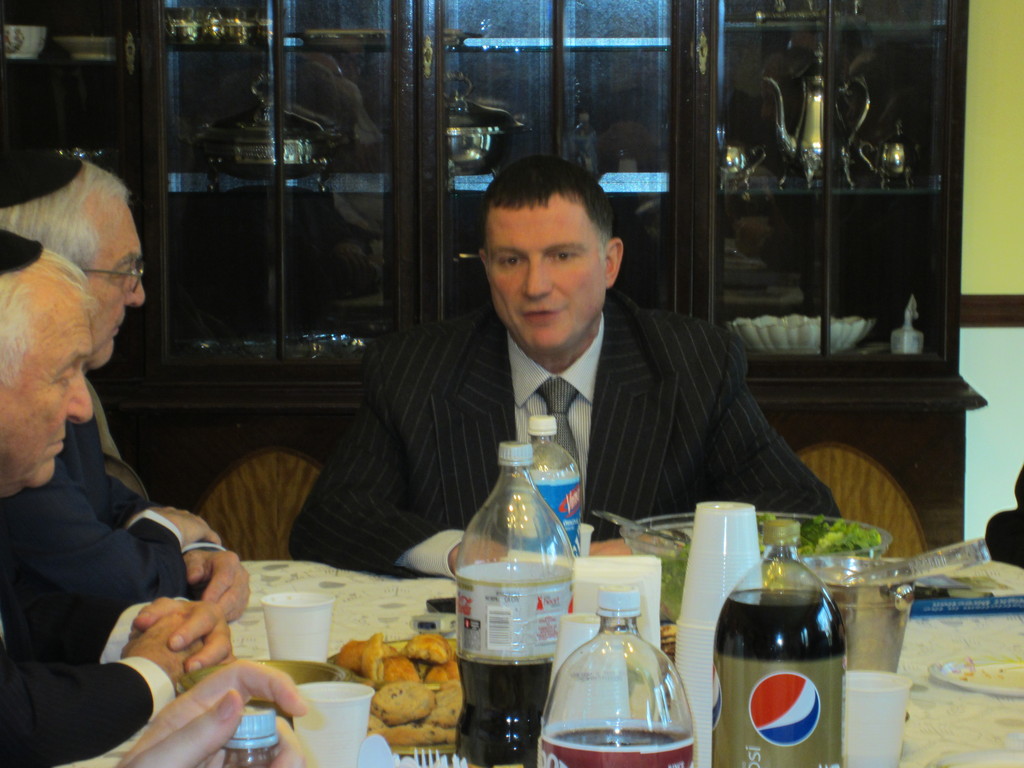Local groups hear options for curbing Iran’s nukes
“My nightmare, I’ll tell you quite honestly is that at some stage [Ahmadinejad] will call a press conference and will embrace some kind of strategic weapon and say, ‘you guys continue talking, I appreciate very much all your tactical discussions, I already have it.’”
Yuli Edelstein, Knesset member and Minister of Public Affairs and the Diaspora, vividly described the concern that brought him to a meeting in Jamaica Estates this week at the home of Dr. Joseph and Karen Frager, Chairman of the board of the World Committee for the Land of Israel. He discussed Israel’s outlook on the Iran crisis, the disaster of the Gush Katif expulsion, that Israel and the Palestinians can co-exist without a peace agreement and the need to educate Israelis and the world on Jewish history and promoting the importance of Yehuda and Shomron to Knesset members and the world.
In another smaller meeting later that day , also facilitated by Frager, and World Committee for the Land of Israel founders Odeleya Jacobs, and Dr. Paul Brody, at the Young Israel of Kew Garden Hills, Naftali Bennett, head of MyIsrael, Israel’s largest grassroots organization with over 80,000 members, presented his views on Iran’s nuclear race and that Israel is not the reason for the conflict in the Arab world.
“The decision that Iran will not acquire the bomb is behind us,” said Bennett, “and the decision to not outsource Israel’s fate to America has been made.” Bennett co-founded and was CEO of Cyota, a leading anti-fraud company, was Benjamin Netanyahu’s Chief of Staff from 2006-2008 and was Director General of the Yesha Council from 2010 to 2012. He served in the IDF in the elite Sayeret Matkal and Maglan units and is a Major in the reserves.
“We are not gung ho on doing this, not saying that it’s inevitable, if America implements crippling sanctions, it might work it might not work,” he said, noting that the “bottlenecks” should be destroyed and “paralyzing sanctions” implemented with ”follow-up sanctions.” When questioned regarding the aftermath of a possible military attack on Iran, Bennett said, “In Israel we have the characteristic to solidify and seem stronger when attacked. Israel can withstand thousands of missiles. Compared to the alternative, it is a no-brainer. The concept of modern Zionism is that Israel is a safe haven for Jews. If Iran acquires the bomb, Israel becomes the most dangerous place for Jews. Bibi (Netanyahu) gets it. Ahmadinejad gets it.”
When asked on CNN the next day if an Israeli strike is inevitable he said, “There is one last chance to avert an attack (from Israel) and that’s if America immediately implements devastating sanctions that will bring the Iranian regime to a collapse, that’s the one thing that will prevent the need for an attack but we’re not there.”
Bennett explained that Iran has tripled the pace of uranium enrichment over the last two years and is working on moving their nuclear facilities underground where they would be immune from a potential Israeli attack. He added that Israel can’t listen to Obama’s exhortations not to bomb Iran. “We’d be outsourcing our existence to Obama—would any American be willing to outsource their existence to a friendly nation?’
The best case scenario, he said is if “Obama steps up to the plate, brings Iran to economic collapse, presents a military threat and Iran gives up the program.” It is important to “apply pressure to Obama to accelerate sanctions, apply sanctions after an attack by Israel and create legislation to arm Israel.”
Bennett also presented his case for a program of coexistence with the Arabs. “In Israel and the region, everyone is fed up with the issue of the Palestinians,” he said. “There is not going to be peace, that’s the reality, it’s ridiculous (to say) Palestine first now that the whole Arab world is falling apart. Bibi changed the paradigm that anything in the Mideast has to do with the Palestinians. It’s Iran. The Arabs couldn’t care less about the Palestinians. It’s up to us to reach a modus vivendi.”
He showed a photo of a view of the Tel Aviv coastline from the Shomron, how close it is, to indicate how dangerous it is to even contemplate giving control of that area to the Arabs. His plan, “The Israel Stability Initiative” is a plan that delineates “how to live with the conflict.” It involves applying Israel’s sovereignty over area C containing 100% of the Jews in Yehuda and Shomron and 2% of the Palestinians; and offer citizenship to the 48,000 Arabs living in this area. There will be no refugee descendants absorbed into any of these areas; they will be absorbed into the countries where they now reside. Israel would sever the connection to Gaza, noting that it is independent and not under Israel’s jurisdiction.
He noted that none of the towns in Yehuda and Shomron are built on Arab land, including Migron and Ramat Gilad, and should be permitted to remain and build. He noted that the judicial system is “wagging the State,” instead of politicians deciding policy. “Bibi has to make clear that he’s the executive in charge and has to run Israel,” he said. “I have harsh criticism against the government, letting the legal-very left wing-run government policy.”
In his talk, Yuli Edelstein mentioned the “wider goals that Ahmadinejad has; try to explain to the rest of the world that it always starts with the Jews but it doesn’t end with the Jews.” He gives “credit to the Prime Minister with his ‘obsession’ (with Iran’s nuclear buildup) when everyone was mocking him and now it is not the case.”
Yuli Edelstein was born in Chernovitz, Ukraine, began to study Hebrew on his own during University, and became a Refusnik and Prisoner of Zion when he applied to leave the USSR for Israel. He made Aliyah in 1987 and has been a member of Knesset on various committees, often holding different ministerial positions since 1996.
Among the other challenges he mentioned are the “old” challenges of terrorism that, although fewer, there still are “unsuccessful” terrorist attacks, “thank G-d our boys are doing great work, the army, the secret service. The attempts are always there.”
He also discussed the events that led up to the expulsion from Gush Katif, how he and others were against it and its repercussions. “It was not just a terrible thing that happened to personal friends. It was strategic damage. It’s a dead end, the expulsion, both ways you lose, the pain and emotions. All these irresponsible steps pushing us further from any possible solution on this front and on the Palestinian front.”
”There’s no solution now (to the Palestinian problem), but it’s not necessarily pessimistic,” he said. “Meanwhile, it’s a pretty manageable situation. Look at the best news we have, many of the news bureaus are closing down, their foreign correspondents are closing offices because the conflicts are elsewhere.”
“We have to talk about the big issues—the future of the State of Israel.” He talks about the need “to build the process, we have to reclaim the narrative. We have to go back a couple thousand years and explain why we are there, how before the Holocaust, the Zionist movement was trying to reestablish a state in Israel. It’s a slow process but we have to do it. First and foremost we have to start the process in Israel so we as Israelis when we speak, especially the elected officials, would be very sensitive to the language.” He stressed the importance of saying Yehuda and Shomron rather than West Bank and Jewish communities rather than settlements. “It’s no problem to evacuate a settlement,” he said, “but to evacuate Jewish communities, you sound like a Nazi.”
He discussed the importance of lobbying, specifically when visiting Israel from the U.S. “Everyone can play a role, can change a lot, showing support. Supporting certain issues can promote certain views and can have an influence on how the Knesset looks at the issues.”

 64.0°,
A Few Clouds
64.0°,
A Few Clouds 









